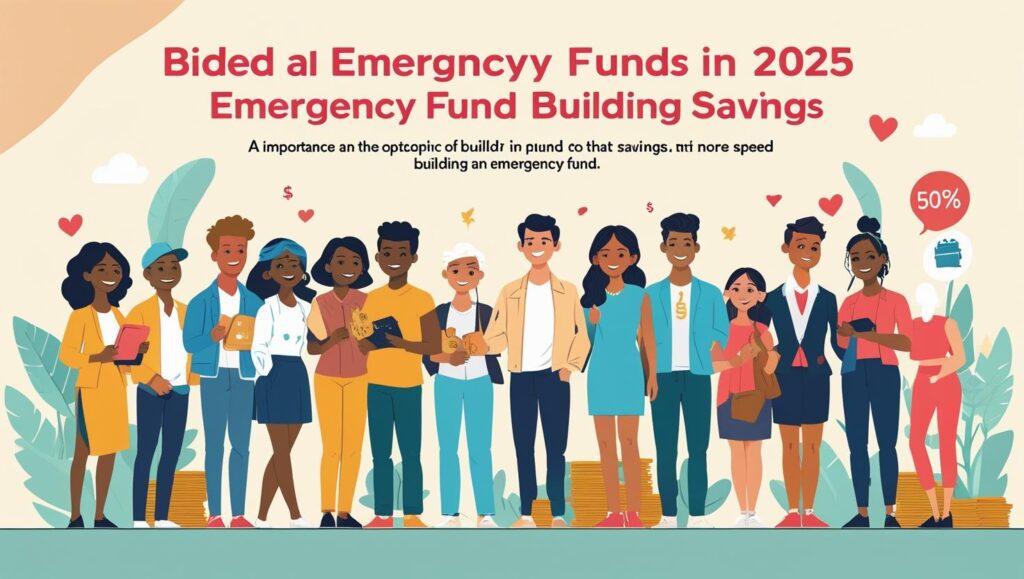🧨 What is an Emergency Fund — And Why It’s Critical in 2025
An emergency fund is money that you keep aside only for real, unavoidable emergencies — not for vacations, gadgets, or Diwali shopping. Think of it as your financial life jacket.
With economic uncertainty, job cuts, rising medical bills, and global disruptions like pandemics and wars, having a financial backup is not just smart — it’s survival.
Without one, even a single crisis can wipe out your savings, increase debt, or even ruin your credit score.
🔍 What Counts as an Emergency?
Many people are confused about what really qualifies as an “emergency”. Let’s be clear:
✅ Yes:
- Sudden job loss or salary cut
- Hospitalization or major medical cost
- Death or illness in family
- Emergency house repair (leakage, electric fault)
- Legal issues
- Pandemic lockdowns
❌ No:
- Buying the new iPhone
- Shopping during online sales
- Attending a destination wedding
- Taking a personal loan for a trip
Emergencies are unplanned, urgent, and unavoidable.
🧾 How Much Emergency Fund Should You REALLY Have?
The golden rule is to keep at least 3 to 6 months of your essential expenses.
Step-by-Step to Calculate:
- Add up your monthly basic expenses:
- Rent/EMI
- Food
- Utilities (electricity, Wi-Fi)
- School fees
- Insurance premiums
- Transport/fuel
- Multiply by 3 to 6 based on your job stability.
| Status | Monthly Expense | Emergency Fund (3–6 months) |
|---|---|---|
| Student | ₹10,000 | ₹30,000 – ₹60,000 |
| Working Individual | ₹25,000 | ₹75,000 – ₹1.5 Lakh |
| Family of 4 | ₹40,000 | ₹1.2 Lakh – ₹2.4 Lakh |
📌 If you’re self-employed, keep 6–12 months’ worth, as your income may fluctuate.

💣 What Happens If You Don’t Have an Emergency Fund?
Let’s be honest — most people don’t think about savings until it’s too late. Here’s what happens:
🏦 You Use Credit Cards or Loans
High interest (24–36%) + monthly EMIs = debt trap.
🪙 You Sell Investments Early
You break FDs or withdraw mutual funds, losing potential returns.
💍 You Sell Assets
Gold, bike, even your mobile gets sacrificed — with emotional loss.
😰 Stress & Panic
Financial stress leads to poor decisions, anxiety, even depression.
Having a fund means you sleep peacefully, no matter what happens.
⚡ How to Build an Emergency Fund — Even on a Low Income
You don’t need to start with ₹50,000. Start small and stay consistent.
✅ Step 1: Open a Dedicated Emergency Savings Account
Keep it separate from your daily use account. This reduces temptation to spend.
✅ Step 2: Automate Your Savings
Use standing instructions or auto-debit to move a fixed amount every month.
Example: ₹1,000/month = ₹12,000/year (without effort!)
✅ Step 3: Track & Cut Non-Essentials
Make a list of avoidable expenses:
- OTT subscriptions you don’t watch
- Junk food or Zomato spends
- Costly gadgets/upgrades
Transfer this amount to your emergency fund.
✅ Step 4: Use Extra Income
Got a bonus, cashback, tax refund, birthday gift, or freelance project?
💡 Treat it as fuel for your fund.
✅ Step 5: Set Milestone Targets
Break the savings into goals:
- Phase 1: ₹10,000
- Phase 2: ₹25,000
- Phase 3: ₹50,000+
Each level gives you confidence and momentum.
🏦 Where Should You Park Your Emergency Fund?
Your fund should be:
- Safe ✅
- Liquid ✅
- Low risk ✅
🔹 Best Options:
| Option | Return | Liquidity | Risk |
|---|---|---|---|
| High-Interest Savings Account | 3–6% | Instant | Very Low |
| Liquid Mutual Funds | 6–7% | 1 Day | Low |
| Sweep-in FD | 5–6% | On Demand | Very Low |
Pro tip: Avoid stock market, NPS, PPF, or long-term lock-ins for this purpose.
💡 Emergency Fund vs SIP vs Insurance – What’s the Difference?
| Type | Purpose | Use Case |
|---|---|---|
| Emergency Fund | Urgent expenses | Job loss, repair, hospital |
| SIP/Mutual Fund | Long-term wealth | Retirement, goals |
| Insurance | Risk coverage | Illness, death, accident |
All three are important — but your emergency fund should come first.
📈 Advanced Tip: After Emergency Fund, What Next?
Once your emergency fund is ready, focus on:
- Health Insurance
- Term Insurance
- SIP for long-term wealth
- Side Hustles or passive income streams
You can also start investing in:
- Index Funds
- Gold ETFs
- REITs
- Hybrid mutual funds
Let your emergency fund give you the confidence to take bold steps.
💬 FAQs About Emergency Fund
Q1: How fast can I build a ₹50,000 emergency fund?
A: Save ₹100/day or ₹3,000/month → in 16–18 months you’ll have it!
Q2: Should I keep it in cash at home?
A: Only a small part (₹2,000–₹5,000). The rest should be in a liquid, secure account.
Q3: Can I pause it once I hit ₹1 Lakh?
A: Yes! After reaching your goal, shift focus to investments.
Q4: How to explain this to my family?
A: Compare it to a “health insurance for money.” Show how it saved others during COVID.
🧠 Final Thoughts: Make Emergency Fund Your First Financial Goal in 2025
Life is uncertain. Jobs, health, and income can change overnight. But your financial stability doesn’t have to.
An emergency fund is not just money — it’s peace of mind, a confidence booster, and your first step to true financial freedom.
📌 Start with ₹500. Build the habit. Protect your future.
💬 Do you have an emergency fund already? Share your journey in the comments below!
📲 Want more practical money tips?